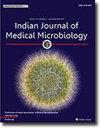Breakpoint Withdrawals and Emerging Evidence: Reframing Clinical Decisions for B. cepacia complex and S. maltophilia
IF 1.4
4区 医学
Q4 IMMUNOLOGY
引用次数: 0
Abstract
Background
Burkholderia cepacia complex (BCC) and Stenotrophomonas maltophilia are intrinsically resistant non-fermenting gram-negative bacilli increasingly implicated in healthcare-associated infections, especially among immunocompromised patients. Their complex resistance mechanisms and diagnostic ambiguity complicate clinical management. Recent changes in antimicrobial susceptibility testing (AST) guidelines further complicate clinical management.
Objective
To outline the impact of breakpoint withdrawals by CLSI and EUCAST on AST interpretation and treatment strategies for BCC and S. maltophilia and emphasize the need for evidence-based, context-specific treatment strategies.
Content
CLSI (2025) and EUCAST (2024) have removed breakpoints for most agents against BCC, requiring MIC reporting based on WT/NWT distributions. For S. maltophilia, CLSI no longer supports monotherapy with Co-trimoxazole or levofloxacin; EUCAST retains a breakpoint only for the Co-trimoxazole.
Resistance mechanisms, including β-lactamases and RND efflux pumps, limit AST reliability. Diagnostic challenges include species misidentification and distinguishing infection from colonization. Therapeutic options remain limited. Trimethoprim-sulfamethoxazole has reduced efficacy; minocycline, fluoroquinolones, and cefiderocol show inconsistent outcomes. Combination therapy offers no clear advantage and should be individualized. These changes necessitate MIC-based, genomics-informed approaches to guide therapy, particularly in low-resource settings.
断点停药和新出现的证据:重建洋葱芽孢杆菌复合物和嗜麦芽葡萄球菌的临床决策
背景:洋葱伯克霍尔德菌复合体(BCC)和嗜麦芽窄养单胞菌是内在耐药的非发酵革兰氏阴性杆菌,越来越多地与卫生保健相关感染有关,特别是在免疫功能低下的患者中。其复杂的耐药机制和诊断的模糊性使临床管理复杂化。最近对抗菌药物敏感性试验(AST)指南的修改进一步使临床管理复杂化。目的概述CLSI和EUCAST的断点停药对BCC和嗜麦芽链球菌AST解释和治疗策略的影响,并强调需要循证、具体情况的治疗策略。ContentCLSI(2025)和EUCAST(2024)已经删除了大多数代理针对BCC的断点,要求基于WT/NWT分布的MIC报告。对于嗜麦芽链球菌,CLSI不再支持复方新诺明或左氧氟沙星单药治疗;EUCAST仅为复方新诺明保留一个断点。抗性机制,包括β-内酰胺酶和RND外排泵,限制了AST的可靠性。诊断挑战包括物种错误识别和区分感染和定植。治疗选择仍然有限。甲氧苄啶-磺胺甲恶唑疗效降低;米诺环素、氟喹诺酮类药物和头孢地罗的结果不一致。联合治疗没有明显的优势,应个体化。这些变化需要基于mic的基因组学方法来指导治疗,特别是在资源匮乏的环境中。
本文章由计算机程序翻译,如有差异,请以英文原文为准。
求助全文
约1分钟内获得全文
求助全文
来源期刊

Indian Journal of Medical Microbiology
IMMUNOLOGY-
CiteScore
2.20
自引率
0.00%
发文量
154
审稿时长
73 days
期刊介绍:
Manuscripts of high standard in the form of original research, multicentric studies, meta analysis, are accepted. Current reports can be submitted as brief communications. Case reports must include review of current literature, clinical details, outcome and follow up. Letters to the editor must be a comment on or pertain to a manuscript already published in the IJMM or in relation to preliminary communication of a larger study.
Review articles, Special Articles or Guest Editorials are accepted on invitation.
 求助内容:
求助内容: 应助结果提醒方式:
应助结果提醒方式:


